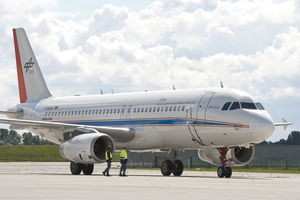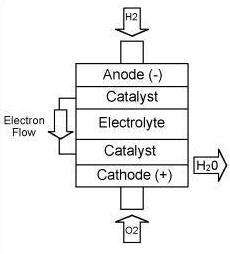Sun, Jul 10, 2011
Results Increase General Industry Understanding Of The
Technology And Its Potential
Fuel cell technology is emerging as a potential solution for
emissions-free ground operations for commercial aircraft, which has
prompted Airbus to partner with the German Aerospace Center
(DLR) in examining the potential of this technology. As part of
that evaluation process, fuel cells were integrated into existing
aircraft and successfully performed the first flight test on a
civil transport aircraft in 2008. In that test, the fuel cell
system provided power for the aircraft’s back-up systems.

DLR Airbus Test Aircraft
In order to gain more details on the potential of fuel cell
technology as supply for electric power in aircraft ground
operation, a DLR designed technology demonstrator has been
installed in the DLR owned A320 fuel cell test aircraft at the
Airbus site in Hamburg. The technology demonstrator consists of a
fuel cell powering an electric motor which drives the nose landing
gear wheels allowing the aircraft to taxi autonomously. The
objective of these tests is to further validate the potential of
the integrated fuel cell technology for powering future aircraft
functionalities such as autonomous taxiing. The data collected in
the tests will be analysed by Airbus and the DLR to further develop
the overall integration of this technology and potential further
optimisation possibilities.
Within the joint R&T activities, Airbus is in charge of the
overall aircraft system architecture and technology integration
into the aircraft, whereas the DLR is driving some of the basic
research activities for aerospace fuel cell technology. The landing
gear itself with the integrated DLR-designed fuel cell powered
motor is provided by Lufthansa Technik in Hamburg.

Basic Fuel Cell Schematic
Airbus considers fuel cell technology as a key contributor
to the ACARE 2020 goals, which foresee the reduction of CO2
emissions by 50%, NOx emissions by 80% and noise by 50%.
Consequently Airbus is pursuing engagement of industrial research
partners in that field. In addition Airbus is strongly engaging in
implementing and testing bio-fuel technology and actively supports
the installation of local bio-fuel value-chains around the world.
With regard to wider initiatives such as Air Traffic Management
(ATM), Airbus co-operates with all the protagonists to deliver the
best solutions for airlines and the environment. Airbus has a
leading role in the SESAR program to improve the efficiency of
European ATM and works with teams involved in the NEXT GEN project
designed to do the same for US ATM.
More News
From 2023 (YouTube Edition): "Ain’t Your Daddy’s Super Cub”—Don Wade Co-owned by Don and Ron Wade—the former of Don’s Dream Machines, a storied >[...]
Pilot-Rated Passenger Reported That The Pilot Did Not Adequately “Round Out” The Landing Flare And The Airplane Bounced And Yawed To The Right Analysis: The pilot state>[...]
Dead Reckoning Dead reckoning, as applied to flying, is the navigation of an airplane solely by means of computations based on airspeed, course, heading, wind direction, and speed,>[...]
Aero Linx: Lake Amphibian Club This website is created and sponsored by the Lake Amphibian Club, to help spread the word about these wonderful, versatile amphibians that can land j>[...]
“I am deeply honored to be sworn in as NASA administrator. NASA’s mission is as imperative and urgent as ever — to push the boundaries of human exploration, ignit>[...]
 Classic Aero-TV: In Praise of Alabamas Patriot Aircraft USA
Classic Aero-TV: In Praise of Alabamas Patriot Aircraft USA NTSB Final Report: Cirrus Design Corp SR22
NTSB Final Report: Cirrus Design Corp SR22 ANN's Daily Aero-Term (12.21.25): Dead Reckoning
ANN's Daily Aero-Term (12.21.25): Dead Reckoning ANN's Daily Aero-Linx (12.21.25)
ANN's Daily Aero-Linx (12.21.25) Aero-News: Quote of the Day (12.21.25)
Aero-News: Quote of the Day (12.21.25)




